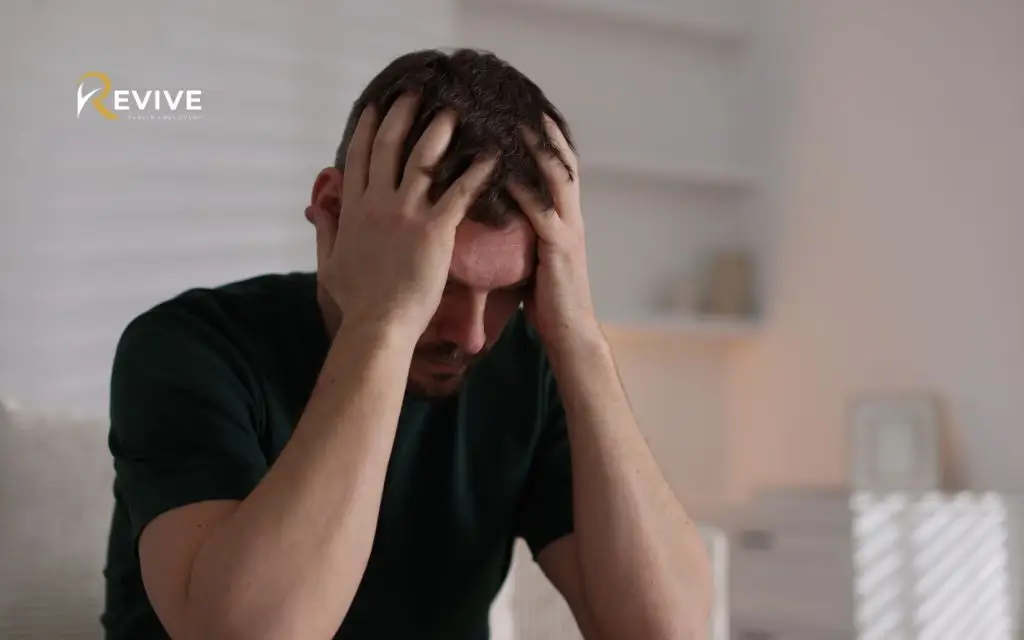More than one in four Coloradans experience poor mental health, yet many face their struggles without the professional support that could change everything. Mental health treatment for depression includes evidence-based therapies, personalized care plans, and compassionate services designed to help you move beyond persistent sadness and reclaim the life you deserve.
Whether depression is new to you or previous approaches haven’t brought relief, understanding your options marks the beginning of healing. Across Denver and Colorado, accessible outpatient depression treatment centers like Revive Health Recovery provide comprehensive care that adapts to your schedule and circumstances without requiring hospitalization.
This guide covers what you need to know about depression treatment: recognizing when to seek professional help for depression, exploring different therapy approaches, navigating insurance coverage, and taking your first step toward recovery. Effective treatment exists, and support is closer than you think.
Understanding depression and when to seek treatment
What is depression? Recognizing the signs
Depression goes beyond temporary sadness. Major depressive disorder (MDD) is a medical condition that affects your brain chemistry, emotions, and physical health. The Diagnostic and Statistical Manual (DSM-5) recognizes clinical depression as a disorder requiring professional treatment.
Common symptoms include persistent sadness that won’t lift, loss of interest in activities you once enjoyed, overwhelming fatigue, changes in sleep patterns, appetite shifts, difficulty concentrating, and feelings of worthlessness. These symptoms interfere with your daily life, relationships, and ability to function at work or home.
The difference between normal sadness and clinical depression lies in duration, intensity, and impact. Temporary sadness responds to time and self-care. Depression persists for weeks or months, creating a weight that self-help alone cannot lift.
Depression also affects your physical health. Research shows depression increases your risk for heart disease, diabetes, and chronic pain. This connection makes comprehensive mental health treatment for depression essential for your overall wellness.
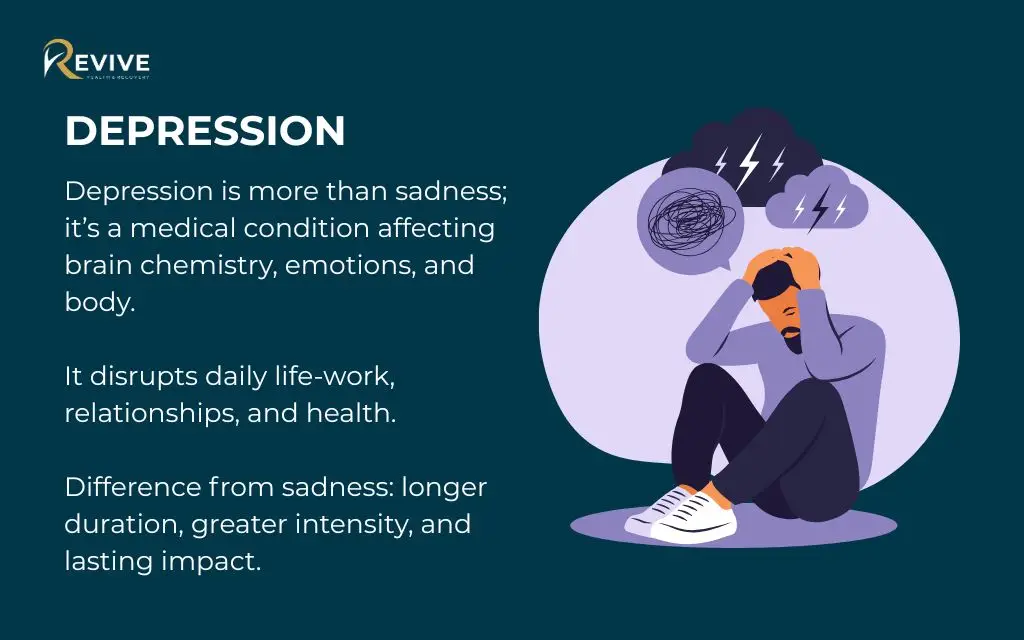
When should you seek professional help for depression?
You should seek professional help when symptoms last more than two weeks and interfere with your daily life. Warning signs include difficulty getting out of bed, withdrawing from friends and family, declining performance at work, or losing interest in things that once brought joy.
If you’ve tried to feel better on your own without success, professional support can provide the tools and structure you need. Therapy offers more than what friends and family can provide, no matter how caring they are.
Immediate help becomes critical if you experience thoughts of self-harm or suicide. Colorado’s 988 crisis line received over 50,000 calls in 2023, highlighting how many people need urgent support. If you’re in crisis, call 988 or go to your nearest emergency room. For non-crisis situations, contact Revive Health Recovery at (303) 268-4655 for same-day appointments and 24/7 support.
Depression statistics in Colorado
Colorado faces unique mental health challenges despite its reputation for outdoor lifestyle and wellness. The state ranks 39th in the nation for mental health care access, creating gaps between those who need help and those who receive it.
More than one in four Coloradans reported poor mental health in 2023. Denver’s behavioral health crisis reflects growing demand for accessible outpatient services that don’t require hospitalization. The good news? Colorado created the nation’s first standalone Behavioral Health Administration in 2022, transforming how mental health care reaches communities.
Reducing stigma remains essential. Many people delay seeking help because they worry about judgment or believe they should handle depression alone. Professional treatment isn’t a sign of weakness. It’s a practical step toward healing, just like seeing a doctor for a physical condition.
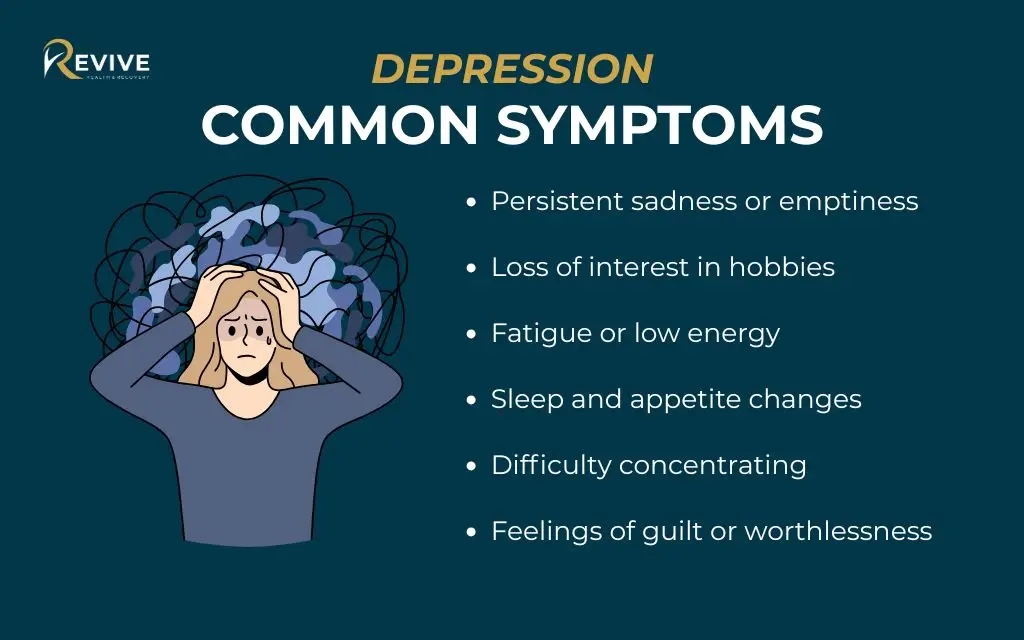
Types of depression treatment: Evidence-based approaches
Psychotherapy (talk therapy)
Psychotherapy provides powerful tools for understanding and managing depression. These approaches teach you skills that create lasting change in how you think, feel, and respond to challenges.
Cognitive behavioral therapy for depression Colorado stands as one of the most researched and effective treatments. CBT helps you identify negative thought patterns that fuel depression and replace them with more balanced, realistic perspectives. You learn to recognize when your mind spirals into hopelessness and develop techniques to challenge those thoughts.
Research from the National Institute of Mental Health shows CBT creates measurable changes in brain activity. This neuroplasticity demonstrates your brain’s remarkable capacity for healing. Through consistent practice, the pathways that maintain depression can actually rewire toward healthier patterns.
Dialectical behavior therapy (DBT) combines acceptance and change strategies. Originally developed for emotional regulation, DBT teaches you to tolerate distress, manage intense emotions, and improve relationships. This approach works particularly well when depression includes emotional volatility or self-destructive patterns.
Interpersonal therapy (IPT) focuses on your relationships and communication patterns. Depression often strains connections with others, creating isolation that deepens symptoms. IPT helps you address relationship conflicts, life transitions, and communication issues that contribute to depression.
Mindfulness-based approaches integrate meditation and present-moment awareness into treatment. Colorado’s wellness culture embraces these practices, which research shows can prevent depression relapse. Mindfulness teaches you to observe thoughts and feelings without getting caught in them.
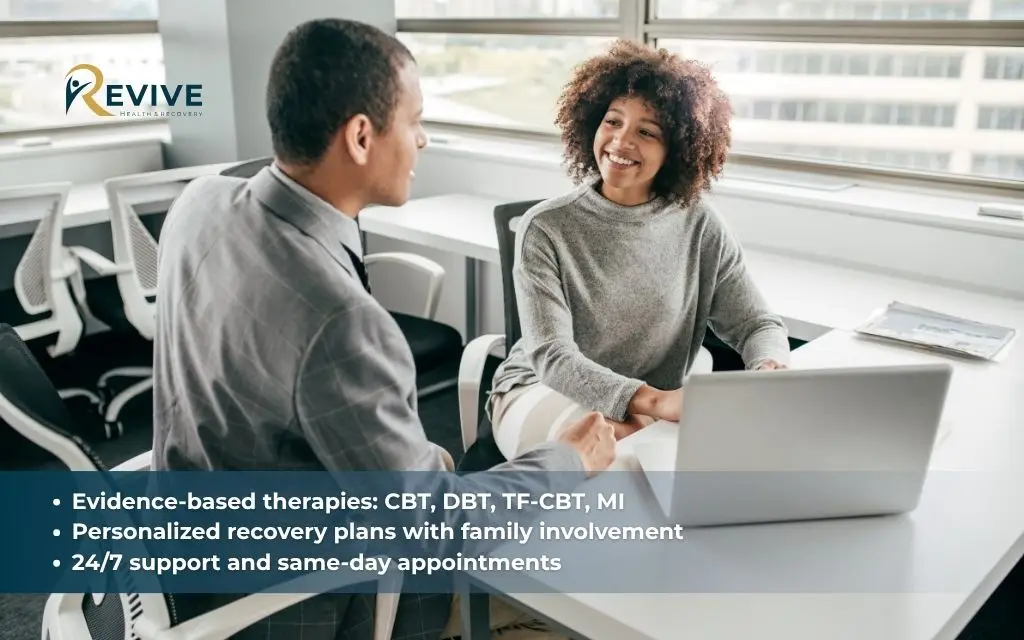
Medication management
Antidepressants can restore chemical balance in your brain, providing relief from symptoms that make daily life difficult. Common medications include selective serotonin reuptake inhibitors (SSRIs) and serotonin-norepinephrine reuptake inhibitors (SNRIs).
Working with a psychiatrist or psychiatric nurse practitioner ensures proper medication selection and monitoring. These medical professionals prescribe and adjust medications while therapists provide counseling. Many people benefit from both approaches working together.
Medication typically takes four to six weeks to reach full effectiveness. Initial improvements may appear sooner, but patience with the process matters. Some people need to try different medications or combinations to find what works best for their brain chemistry.
Approximately 30% of individuals experience treatment-resistant depression, meaning initial approaches don’t provide adequate relief. This doesn’t mean you’re out of options. It means you need personalized, multi-modal approaches that may include different medications, therapy combinations, or additional interventions.
Holistic and complementary therapies
Evidence-based depression therapy near me increasingly includes holistic approaches that address your whole person, not just symptoms. These complement traditional therapy and medication rather than replacing them.
Physical activity acts as a natural antidepressant. Exercise releases endorphins, reduces stress hormones, and improves sleep quality. Colorado’s mountain environment provides unique advantages for nature-based therapy. Research shows time outdoors enhances traditional depression treatment outcomes, combining physical activity with natural mood benefits.
Nutritional counseling addresses the connection between what you eat and how you feel. Certain nutrient deficiencies can worsen depression symptoms. Working with professionals who understand this relationship helps you support your mental health through diet.
Sleep therapy tackles the two-way relationship between depression and sleep problems. Depression disrupts sleep, and poor sleep worsens depression. Learning sleep hygiene techniques breaks this cycle.
Yoga, meditation, and mindfulness practices offer tools you can use daily to manage stress and regulate emotions. These aren’t substitutes for professional treatment, but they strengthen your overall mental health toolkit.
Outpatient vs. inpatient depression treatment
What is outpatient depression treatment?
Outpatient depression treatment allows you to receive professional care while maintaining your daily responsibilities. You attend therapy sessions, meet with providers, and participate in treatment programs without staying overnight at a facility.
Three main types exist:
- Standard outpatient treatment includes weekly or bi-weekly therapy sessions with a counselor or therapist. This works well for mild to moderate depression or as maintenance after more intensive treatment.
- Intensive outpatient program for depression Denver (IOP) provides more structured support without hospitalization. You attend treatment several hours per day, multiple days per week, while returning home each evening. IOP bridges the gap between standard outpatient care and hospitalization.
- Partial hospitalization programs (PHP) offer the most intensive outpatient option. You spend most weekdays in treatment but sleep at home. This level of care suits people who need significant support but don’t require 24-hour medical supervision.
Why must you choose outpatient treatment in Denver?
Outpatient depression treatment without medication Denver and with medication both benefit from the flexibility of community-based healing centers. You continue working, caring for family, and managing daily life while receiving professional support.
This approach helps you apply new skills immediately in real-world situations. Instead of learning coping strategies in a hospital and then trying to transfer them to everyday life, you practice skills where you’ll actually use them.
Cost-effectiveness makes outpatient care accessible to more people. How much does depression treatment cost in Colorado? Without insurance, therapy sessions typically range from $100 to $200, but many factors affect the final cost. Insurance coverage significantly reduces out-of-pocket expenses. For specific pricing at Revive Health Recovery, call (303) 268-4655 to discuss your situation and insurance benefits.
The shift from hospital-based care to community healing centers reflects modern understanding of depression treatment. Most people don’t need hospitalization. They need accessible, flexible support that fits their lives.
At Revive Health Recovery, our 24/7 availability model means you’re never alone in your recovery. Unlike traditional therapy limited to business hours, our team provides round-the-clock crisis support and flexible scheduling that works for your life.
When is inpatient treatment necessary?
Inpatient treatment becomes necessary in crisis situations involving immediate safety concerns. If you’re experiencing active suicidal thoughts with a plan, severe symptoms that prevent you from caring for yourself, or need medical stabilization, hospital admission provides the safety and monitoring you need.
Most people transition to outpatient care after brief inpatient stabilization. The hospital addresses the immediate crisis, then outpatient treatment supports your ongoing recovery.
What to expect from depression therapy Colorado: The treatment process
Initial assessment and diagnosis
Your journey begins with a comprehensive mental health evaluation. This assessment helps your treatment team understand your symptoms, history, and goals. You’ll discuss how depression affects your daily life, any previous treatment experiences, and what you hope to achieve.
Medical history matters because physical conditions sometimes cause or worsen depression symptoms. Thyroid problems, vitamin deficiencies, and other medical issues can mimic or contribute to depression. A thorough evaluation rules out these factors.
Collaborative goal-setting ensures your treatment addresses what matters most to you. Some people want to return to work, others want to repair relationships, and still others want to simply feel joy again. Your goals guide your personalized treatment plan.
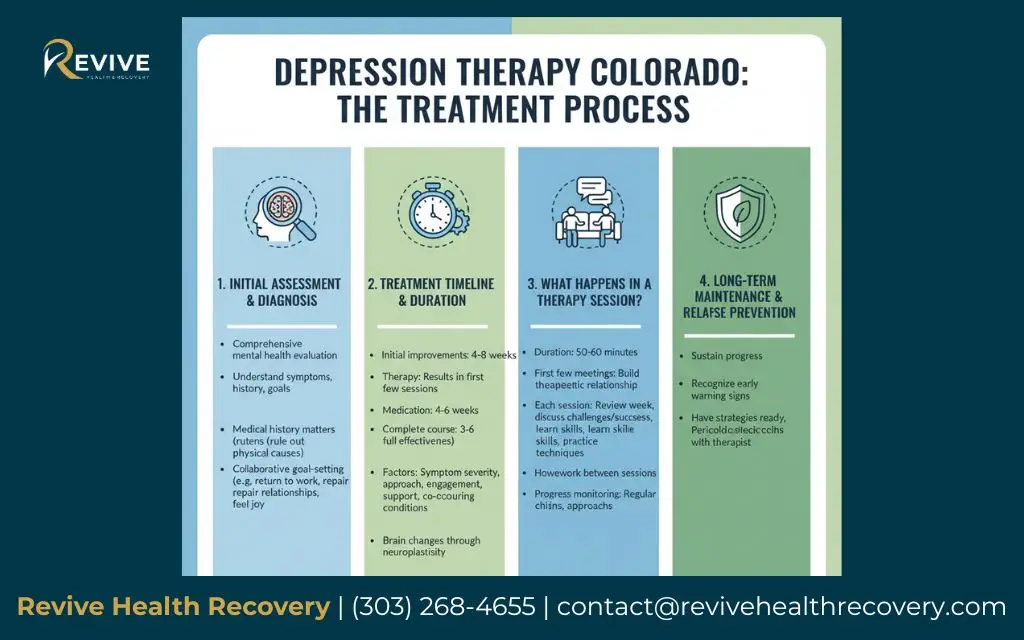
Treatment timeline and duration
How long does depression treatment take in Denver? Most people notice initial improvements within four to eight weeks of starting treatment. Therapy may show results in the first few sessions as you gain new perspectives and tools. Medication typically requires four to six weeks to reach full effectiveness.
A complete treatment course usually spans three to six months, though individual experiences vary. Some people need longer support, while others progress more quickly. The depression recovery timeline Colorado providers see depends on multiple factors: symptom severity, treatment approach, your engagement with therapy, support systems, and whether you’re addressing co-occurring conditions.
Brain changes through treatment demonstrate why patience with the process matters. Neuroplasticity research shows depression treatment physically changes brain structure over time. These changes create lasting improvements rather than temporary symptom relief.
Long-term maintenance and relapse prevention help you sustain progress. Depression can recur, so recognizing early warning signs and having strategies ready protects your recovery. Many people benefit from periodic check-ins with their therapist even after symptoms resolve.
What happens in a therapy session?
Therapy sessions typically last 50 to 60 minutes. The first few meetings focus on building a therapeutic relationship and understanding your experiences. This connection between you and your therapist provides the foundation for effective treatment.
Each session includes reviewing your week, discussing challenges and successes, learning new skills, and practicing techniques. Your therapist might assign homework between sessions to help you apply what you’re learning.
Progress monitoring ensures treatment stays on track. Regular check-ins about your symptoms help your therapist adjust approaches as needed. Some weeks you’ll feel significant progress, while other weeks may feel harder. This variability is normal in the healing process.
Finding the right depression treatment center in Denver
What to look for in a treatment center
- Choosing where to seek help affects your experience and outcomes. Start by verifying that providers hold proper licenses and qualifications. Licensed professional counselors (LPC), licensed clinical social workers (LCSW), psychologists, and psychiatrists each bring different expertise to depression treatment.
- Evidence-based treatment approaches matter more than trendy or unproven methods. Look for centers that use therapies backed by research from organizations like the American Psychological Association or the Substance Abuse and Mental Health Services Administration.
- Flexible scheduling and accessibility determine whether you can actually attend treatment. Working professionals depression therapy Colorado requires evening and weekend options. Parents need scheduling that accommodates childcare. Students need appointments around classes.
- Insurance acceptance affects affordability. Depression treatment covered by insurance Denver reduces your financial burden significantly. Verify whether the center accepts your specific insurance plan before committing.
- A compassionate, non-judgmental environment helps you open up about vulnerable experiences. You should feel respected and heard, never shamed or dismissed.
- Positive reviews and outcomes from previous clients provide insight into what you can expect. While every person’s experience differs, patterns in feedback reveal a center’s strengths.
Questions to ask before starting treatment
Before beginning treatment, ask potential providers these questions:
- What treatment approaches do you use? You want to hear about evidence-based therapies like CBT, DBT, or IPT rather than vague answers.
- What qualifications do your therapists have? Learn about their education, licenses, and experience treating depression specifically.
- Do you accept my insurance? Get specific information about your plan rather than general statements about insurance acceptance.
- What’s your typical treatment timeline? Understanding the expected duration helps you plan and commit to the process.
- Do you offer flexible scheduling? Confirm whether appointments fit your work schedule and life demands.
- How do you handle crisis situations? Know what support exists between sessions or during emergencies.
- Can you provide references or testimonials? Hearing from others who’ve been through treatment offers reassurance.
The Revive Health Recovery Center difference in Denver
At Revive Health Recovery, we understand that depression treatment that works Denver must adapt to your life, not force your life to adapt to treatment. Our approach combines evidence-based care with the flexibility and compassion you need to heal.
We provide comprehensive outpatient depression treatment using cognitive behavioral therapy for depression Colorado, dialectical behavior therapy, and holistic approaches that address your whole person. Our team includes licensed therapists, psychologists, and mental health specialists who work together to support your recovery.
What sets us apart is our commitment to accessibility. We offer 24/7 support because healing doesn’t follow business hours. When you’re struggling at 2 AM, you can reach our team. When you need a same-day appointment, we make it happen. Average wait times for mental health care in Colorado exceed four to eight weeks, but we believe in immediate access to depression treatment.
Our Denver location at 1427 S Federal Blvd provides convenient access throughout the metro area. We serve adults from Denver, Aurora, Lakewood, Arvada, Westminster, and surrounding communities.
We focus on healing, not hospitalization. As a community-based healing center rather than a hospital, we provide intensive support without requiring inpatient admission. This approach costs less and allows you to maintain your daily responsibilities while receiving the care you need.
Our whole-person approach addresses mental health alongside physical wellness, nutrition, sleep quality, and lifestyle factors. We recognize that depression affects every aspect of your life, and effective treatment must address these connections.
Insurance matters to us. We work with most major insurance plans and offer transparent information about costs. Call (303) 268-4655 to verify your specific coverage and learn about payment options.
Insurance coverage and costs for depression treatment
Does insurance cover depression treatment?
Yes, most insurance plans cover mental health treatment for depression. The Affordable Care Act (ACA) requires mental health parity, meaning insurers must cover mental health services equally to physical health services. This includes therapy, counseling, psychiatric care, and medication management.
Medicare and Medicaid depression treatment Denver includes coverage for outpatient therapy and counseling. Medicaid eligibility in Colorado extends to adults meeting income requirements, and the program covers mental health services without excessive out-of-pocket costs.
Private insurance plans vary in their specifics. Your coverage depends on your particular plan, deductible, copays, and whether providers are in-network. Most plans cover a certain number of therapy sessions per year, though limits and requirements differ.
Verifying your specific benefits before starting treatment prevents surprise costs. Call your insurance company or ask Revive Health Recovery to verify coverage for you. We handle insurance verification and can explain what your plan covers.
How much does depression treatment cost in Colorado?
Without insurance, therapy sessions typically cost between $100 and $200 per session. Initial assessments may cost more due to the comprehensive evaluation involved. Psychiatric appointments for medication management usually fall in a similar range.
Several factors affect your final costs:
- Treatment type influences pricing. Standard outpatient therapy costs less than intensive outpatient programs or partial hospitalization. More intensive services provide more support but at higher costs.
- Session frequency matters. Weekly therapy creates different monthly costs than twice-weekly sessions. Your treatment plan determines the frequency you need.
- Treatment duration affects total investment. A three-month course of therapy costs less than a six-month program, though rushing treatment to save money often leads to incomplete healing.
- Provider qualifications can influence rates. Psychiatrists often charge more than licensed therapists due to their medical training and ability to prescribe medication.
With insurance, your out-of-pocket costs depend on your specific plan. Some people pay small copays of $20 to $50 per session. Others pay more until they meet their deductible. Understanding your benefits helps you budget for treatment.
Affordable mental health services for depression Colorado exist for people without insurance or with high-deductible plans. Some centers offer sliding scale fees based on income. Others provide payment plans that spread costs over time.
The investment in treatment pays returns in your quality of life, relationships, work performance, and physical health. Depression’s costs extend beyond treatment fees when you consider missed work, strained relationships, and health complications.
For specific pricing at Revive Health Recovery and to discuss payment options, call (303) 268-4655. Our team provides transparent information about costs and works with you to make treatment accessible.
Getting started: Insurance and payment at Revive Health Recovery
We accept most major insurance plans and handle verification for you. When you call to schedule your first appointment, we’ll gather your insurance information and check your benefits. This verification tells you what your plan covers and what you’ll pay out-of-pocket.
Our transparent pricing means no surprise bills. You’ll know costs upfront so you can make informed decisions about your care.
We also offer payment plans for people who need them. If cost concerns are preventing you from seeking help, talk with our team about options. We believe financial barriers shouldn’t stand between you and healing.
No insurance depression help Colorado exists through our sliding scale options for qualifying individuals. Contact us at contact@revivehealthrecovery.com or call (303) 268-4655 to discuss your situation.
Depression treatment for specific populations
Depression treatment for adults Denver
Adult depression presents unique challenges around work responsibilities, family obligations, and life transitions. Whether you’re establishing your career, raising children, caring for aging parents, or navigating midlife changes, depression affects your ability to meet these demands.
Treatment for adults must accommodate busy schedules and multiple responsibilities. Evening appointments, weekend availability, and teletherapy options make professional help accessible without sacrificing other obligations.
Common adult stressors that contribute to depression include job stress and burnout, financial pressures, relationship conflicts, parenting challenges, and caring for elderly parents. Effective depression counseling for men in Denver and women addresses these real-world pressures rather than treating depression in isolation.
Depression treatment for working professionals
Balancing treatment with career demands requires flexibility and confidentiality. You need a provider who offers appointments outside standard business hours and understands professional pressures.
Working professionals depression therapy Colorado at Revive Health Recovery includes evening and weekend scheduling so you don’t miss work for appointments. We also offer telehealth options for maximum convenience.
Confidentiality concerns often worry professionals who fear stigma in their workplace. Federal law protects your privacy, and your employer won’t know you’re in treatment unless you choose to disclose it. Taking care of your mental health demonstrates wisdom, not weakness.
Many professionals find that addressing depression improves their work performance, creativity, and job satisfaction. The skills you learn in therapy enhance leadership, communication, and stress management at work.
Depression treatment for men
Men experience depression differently than women in some ways. While sadness and hopelessness affect everyone, men more often show irritability, anger, risk-taking behaviors, and physical symptoms like headaches or digestive problems.
Stigma particularly affects men seeking mental health treatment. Cultural messages tell men to be strong, handle problems independently, and avoid appearing vulnerable. These beliefs prevent many men from getting help they need.
Depression counseling for men in Denver addresses these unique barriers. Treatment helps you understand that seeking help demonstrates strength, not weakness. Learning to identify and express emotions creates healthier relationships and reduces suffering.
Men are also less likely to recognize depression in themselves, often attributing symptoms to stress or physical problems. If you’re experiencing persistent irritability, losing interest in activities, feeling agitated, or engaging in risky behaviors, consider whether depression might be the underlying cause.
Depression treatment for women
Women are nearly twice as likely as men to be diagnosed with depression, though symptom presentations may differ. Hormonal influences throughout women’s lives affect mental health during menstrual cycles, pregnancy, postpartum periods, and menopause.
Women’s depression treatment center Colorado addresses perinatal and postpartum depression, which affects many new mothers. Hormonal changes, sleep deprivation, and the stress of new motherhood can trigger depression. Treatment helps you bond with your baby and enjoy early parenthood rather than just surviving it.
Gender-specific stressors include balancing career and family expectations, experiencing discrimination or harassment, managing household responsibilities, and navigating relationship dynamics. Trauma and abuse disproportionately affect women and often contribute to depression.
Treatment that acknowledges these realities helps you address depression’s roots rather than just managing symptoms. Therapy provides a space to explore how societal pressures, relationship patterns, and life experiences contribute to your mental health.
Supporting your depression recovery journey
Coping strategies between sessions
Recovery happens both in therapy sessions and in your daily life. Building healthy routines strengthens your mental health between appointments.
Start your day with structure. Depression often disrupts sleep schedules and daily rhythms. Waking at consistent times, even on difficult mornings, helps regulate your body’s natural cycles.
Mindfulness and stress management techniques provide tools you can use anywhere. Simple breathing exercises reduce anxiety and ground you in the present moment when your mind races with negative thoughts.
Physical activity doesn’t require intense workouts. A 20-minute walk outside combines exercise with nature exposure, both of which benefit mental health. Colorado’s outdoor access makes this easier than in many places.
Nutrition affects mood more than many people realize. Eating regular meals with adequate protein, healthy fats, and nutrients gives your brain what it needs to function well. Skipping meals or relying on processed foods can worsen depression symptoms.
Social connection protects against isolation. Depression tells you to withdraw, but maintaining contact with supportive people provides perspective and comfort. Even brief interactions with friends help.
Overcoming treatment barriers
Stigma and shame prevent many people from seeking help. Remember that depression is a medical condition, not a character flaw. You wouldn’t feel ashamed about treating diabetes or a broken bone. Your mental health deserves the same care.
Time and scheduling challenges feel overwhelming when depression already drains your energy. Starting with one small step, like making a phone call to schedule an appointment, makes the process manageable. At Revive Health Recovery, our flexible scheduling accommodates your life rather than forcing you to rearrange everything.
Treatment-resistant depression frustrates people who don’t respond to initial approaches. If you’ve tried therapy or medication without adequate relief, don’t give up. Multiple treatment options exist, and personalized combinations often work when single approaches don’t.
Finding motivation when depressed creates a catch-22. Depression saps motivation and energy, yet treatment requires effort. Remember that you don’t need to feel motivated to take action. Action often creates motivation rather than the other way around.
Long-term recovery and relapse prevention
Your brain changes through treatment, creating new neural pathways that support healthier thinking and emotional regulation. This neuroplasticity means improvements can last beyond your active treatment period.
Maintenance strategies help you sustain progress after symptoms resolve. Many people continue occasional therapy sessions as check-ins rather than active treatment. This ongoing support catches potential setbacks early.
Recognizing early warning signs protects your recovery. Learn your personal indicators that depression might be returning. Common signs include sleep changes, increased irritability, withdrawing from activities, or negative thought patterns resurfacing.
Building resilience prepares you for life’s inevitable challenges. Overcoming depression with professional help teaches you skills that apply to future difficulties. You develop confidence in your ability to handle hardship.
Life after depression treatment includes ups and downs like everyone experiences. The difference is you now have tools, understanding, and support systems to navigate challenges without sliding back into severe depression.
FAQs about mental health treatment for depression
How long does depression treatment take to work?
Most people notice improvements within four to eight weeks of starting mental health treatment for depression. Therapy often shows results in early sessions as you gain new perspectives and coping tools. Medication typically takes four to six weeks to reach full effectiveness. Complete treatment usually spans three to six months, though timelines vary individually. For specific expectations based on your situation, contact Revive Health Recovery at (303) 268-4655.
What is the most effective treatment for depression?
Research shows cognitive behavioral therapy (CBT) and antidepressant medication are both highly effective evidence-based depression therapy approaches. Combining therapy and medication often provides the best outcomes for moderate to severe depression. The most effective treatment depends on your specific symptoms, preferences, and circumstances. Revive Health Recovery offers comprehensive assessments to determine the optimal approach for your situation.
Can I overcome depression without medication?
Yes, many people successfully treat depression through psychotherapy alone, particularly for mild to moderate cases. Cognitive behavioral therapy for depression Colorado, DBT, and interpersonal therapy can be highly effective without medication. However, moderate to severe depression often responds best to combined therapy and medication. Revive Health Recovery’s team helps you determine whether medication would benefit your recovery.
Is depression treatment covered by my insurance?
Most insurance plans cover mental health treatment for depression equally to physical health services under the Affordable Care Act. This includes therapy, counseling, and psychiatric care. Medicare and Medicaid depression treatment Denver is also covered. For verification of your specific coverage, call Revive Health Recovery at (303) 268-4655 or email contact@revivehealthrecovery.com.
What’s the difference between a therapist, psychologist, and psychiatrist?
Therapists and licensed professional counselors provide talk therapy and counseling. Psychologists hold doctoral degrees and offer therapy plus psychological testing. Psychiatrists are medical doctors who prescribe medication and provide psychiatric care. At Revive Health Recovery in Denver, our team includes various qualified mental health professionals who collaborate to provide comprehensive depression treatment tailored to your needs.
Why choose Revive Health Recovery for your depression treatment?
When depression affects your daily life, you need more than clinical treatment. You need compassionate, comprehensive care that meets you where you are and adapts to your circumstances.
At Revive Health Recovery in Denver, we specialize in holistic depression treatment Denver Colorado that fits your life. Our approach combines evidence-based therapies with flexibility and 24/7 support that traditional providers can’t match.
What makes us different:
- We use proven therapies like cognitive behavioral therapy for depression Colorado, dialectical behavior therapy, and holistic approaches backed by research from the National Institute of Mental Health and the American Psychological Association.
- Our flexible scheduling includes evening, weekend, and same-day appointments for busy professionals and families. We understand that healing can’t wait for convenient business hours.
- We provide 24/7 support and round-the-clock crisis availability. When you’re struggling at any hour, our team is here to help.
- We’re a healing center, not a hospital. Our outpatient approach provides intensive support without requiring inpatient admission, allowing you to maintain work and family responsibilities.
- Our whole-person approach addresses mental health, physical wellness, nutrition, sleep quality, and lifestyle factors that affect your recovery.
- Our convenient Denver location at 1427 S Federal Blvd provides easy access throughout the metro area, serving communities including Aurora, Lakewood, Arvada, and Westminster.
- We accept most major insurance plans and offer transparent pricing so you understand costs upfront. We also provide payment options for people who need them.
- Our experienced team includes licensed therapists, psychologists, and mental health specialists dedicated to your recovery. Every team member brings compassion and expertise to your care.
Conclusion: Start your healing journey today
Mental health treatment for depression isn’t just about managing symptoms. It’s about reclaiming your life, rediscovering joy, and building resilience to face whatever comes next. You don’t have to struggle alone, and you don’t have to wait months for help.
Depression is treatable. Recovery is possible. The right support makes all the difference.
Whether you’re seeking treatment for yourself or supporting a loved one, Revive Health Recovery provides compassionate care tailored to your needs, schedule, and goals. Our team has helped countless Coloradans move from surviving to thriving through evidence-based depression treatment.
Call us now at (303) 268-4655. We’re available 24/7 to answer questions and schedule your first appointment. You can also email us at contact@revivehealthrecovery.com or visit us at 1427 S Federal Blvd, Denver, CO 80219.
Don’t let depression control another day of your life. Start your healing journey with Revive Health Recovery, where compassionate care meets evidence-based treatment right here in Denver.
You deserve to feel better. Let us help you get there.
